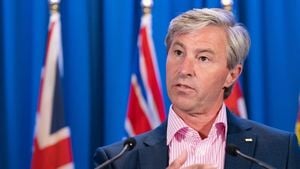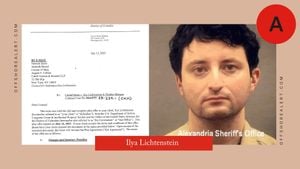Donald Trump’s unexpected return to the White House after the recent election has sent ripples of anxiety mixed with cautious optimism across Europe, particularly concerning the war in Ukraine. While some European leaders are fretting over the ramifications of Trump’s potential policies, many Ukrainians see hope where others see dread.
Josep Borrell, the European Union’s top diplomat, reflected the prevailing worry when he noted, “It is not the end of the world, but the beginning of a different world.” Trump had promised during his campaign trail to quickly bring the war to an end, but his approach raises questions about how equitable such negotiations would be for Ukraine.
Brussels is now closely monitoring Trump’s selections for key positions within his administration, as they could provide insights on his foreign policy direction. Nominations of seasoned politicians like Senator Marco Rubio for Secretary of State and Representative Mike Waltz for National Security Advisor initially brought some relief, with their established support for Ukraine underscoring hopes of stronger U.S. backing.
Yet, not all choices have been met with enthusiasm. The nomination of Tulsi Gabbard, former Democratic representative, as Director of National Intelligence stirred alarm. Known for her controversial views, Gabbard has been accused of echoing Kremlin narratives, prompting fears she might influence Trump to reconsider U.S. support for Ukraine.
Across the Atlantic, feelings are equally mixed. Many Ukrainians, tired of the Biden administration’s slow and sometimes timid approach, are finding new hopes with Trump’s administration. While they recognize his threats to cut U.S. aid and expectations of territorial compromises, some view him as less bureaucratic, believing he could bring decisive action to conclude the war.
A Ukrainian military commander encapsulated this sentiment succinctly by saying, “Trump's rise to power gave Ukraine hope… He is stronger than Biden and is ready to make strong decisions.” This hope contrasts sharply against the backdrop of their accumulated frustrations with what they perceive as Biden’s lackluster support.
On the battlefield, the reality remains grim. Russian forces continue their advances, and Ukrainian troops face significant pressures, grappling with manpower shortages. This dire situation leads many military officials to argue for immediate diplomatic initiatives, signaling their readiness for negotiations.
“The only way left is the diplomatic path,” stated the anonymous drone commander, emphasizing the urgency of seeking peace initially feared as just another loss.
Concerns echo through the ranks, with some senior officials fearing negotiations may spell disaster for Ukraine if it falls victim to Putin’s strategy to exploit ceasefires for regrouping. A senior military official warned cautioningly, “negotiation now could be a fatal mistake,” highlighting their insistence the U.S. should bolster Ukrainian defenses rather than revert to half-measures.
For now, there’s cautious optimism. Figures like Oleksandr Chalyi, Ukraine's former ambassador to Washington, hint at the potential strength Trump could bring to negotiations. He articulated doubt over Trump's willingness to capitulate to Russia, adding to the narrative of Trump’s strongman image being more amenable to supporting Ukraine's demands.
Ukrainian President Volodymyr Zelenskyy, who has publicly welcomed conversations with Trump, has insisted on the necessity of ensuring any peace deal does not infringe upon Ukraine’s sovereignty. During talks, he emphasized, “We all want to end this war, but a fair ending,” stressing it is not only about stopping the fighting but making sure Ukraine retains its territorial integrity.
The leadership within Ukrainian churches has also cautiously welcomed Trump's election, with various religious figures expressing hope for the U.S. to assist Ukraine effectively. Major Archbishop Svetoslav Shevchuk of the Greek Catholic Church articulated this sentiment, saying, “There is much anxiety… but we hope he will listen to our motherland’s voice.” Such calls for support represent the prevailing belief among Ukrainians yearning for peace amid overwhelming hardships.
The Ukrainian Orthodox Church, meanwhile, sees Trump’s return as potentially beneficial, with leaders calling for inter-religious harmony and stability to overcome the current suffering. Some prominent clerics have noted, “The new president has said he will end wars in the modern world — people are asking themselves how he will do this,” speculating about how he might navigate the multifaceted issues arising from the conflict.
While official policies remain to be clarified, the sentiments on both sides of the ocean encapsulate the complex web of hope and anxiety surrounding Trump’s latest presidency. The consequences will not only reshape Ukraine's fate but will likely recalibrate transatlantic relations and the broader geopolitics of the European continent.
Trump's re-election could signal significant shifts, not just for the U.S. and Ukraine but across Europe, which is now poised to navigate uncertain waters with renewed caution and hope.



